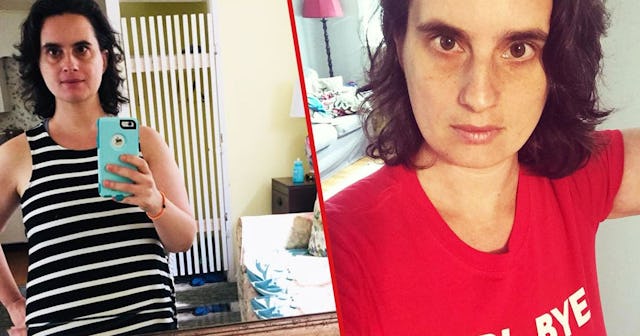BMI Is Actually B.S. And We Need To Stop Using It As A Measure Of Health

Like pretty much 99% of the women I know, I’ve had times in my life when I’ve hated my body. Years when I worried and fretted about my weight. Years when I skipped meals, starved myself. I look back on my early 20s, the thinnest I’d ever been—when I would live on nothing but coffee until 6 p.m.—and I know I wasn’t happier then. Or healthier. Not by any means.
But those years were probably the only years that I was considered “healthy” in the medical world. Yep, back when I was 30 pounds lighter—obsessed with being thin, feeling dizzy all the time because I wasn’t properly nourished—those were the years of my life when I was a “normal” weight, a normal BMI.
Oh, BMI. Why is the medical world so completely obsessed with a person’s BMI?
Courtesy of Wendy Wisner
As you probably know, BMI stands for Body Mass Index, and it’s a formula used to express the relationship between your height and weight. Your doctor (or an online calculator) takes your height and weight, does a fancy little calculation, and then gives you a number which is supposed to tell you whether you are “normal,” “overweight,” or “obese.” In turn, this is supposed to paint a picture of your overall health.
There are so many fucking things wrong with BMI—and I’m not the only one who thinks this. Even those in the healthcare world think it’s a total crock of shit.
Take Robert H. Shmerling, a doctor and editor at Harvard Health Publishing.
“It’s important to recognize that BMI itself is not measuring ‘health’ or a physiological state (such as resting blood pressure) that indicates the presence (or absence) of disease,” writes Dr. Shmerling. “It is simply a measure of your size. Plenty of people have a high or low BMI and are healthy and, conversely, plenty of folks with a normal BMI are unhealthy.”
Courtesy of Wendy Wisner
Thank you. Amen.
Dr. Shmerling shares the example of someone who smokes or has a family history of heart disease. That person could have a “normal” BMI, but still have a higher risk of cardiovascular disease than someone with a “high” BMI.
Exactly. And BMI doesn’t take into consideration how much of your body weight is muscle, how much is fat, where the fat is distributed, what your genetic make-up is like, how active you are, what your overall health habits look like—and so much more.
Guess what else? BMI—which has been used by doctors to measure “health” for over a hundred years—wasn’t even invented to describe health and well being at all. BMI was invented in the 1830s by Lambert Adolphe Jacques Quetelet, a dude from Belgium who wasn’t even a doctor (he was an astronomer, mathematician, statistician and sociologist).
At that time, the purpose of BMI was to measure population statistics, not health. Not only that, but Quetelet was a racist sympathizer, and his BMI calculations were based solely on the measurements of French and Scottish people…over 200 years ago.
Courtesy of Wendy Wisner
No wonder my curvy Eastern European Jewish frame is considered “overweight” by Quetelet’s measurements. JFC.
Dr. Shmerling argues that perhaps BMI shouldn’t be eliminated completely, but that—like cholesterol, blood pressure, and blood sugar—it shouldn’t be a measurement used on its own to assess health. Instead, BMI should be one factor taken into consideration when looking at the complete health picture of a person.
I get that. But I beg to differ.
Any number or measurement—and clearly BMI is an antiquated way of measuring the body—that puts labels on people like “overweight” or “obese” is damaging. Period. These labels stay with you. They stick to you like glue. They get into your bones, pierce your psyche, and can trigger all kinds of body dysphoria and disordered eating patterns.
I am not saying that having too much weight on your body isn’t a cause of health issues at times. But too often weight is blamed for all kinds of bullshit things when—especially when taken in isolation—it has very little to do with the overall well-being of an individual.
Like diet culture—and the toxic notions about beauty, perfectionism, and self-worth that going along with that—BMI needs to go. It stigmatizes people, from childhood until old age. It was made up by a racist non-doctor who wasn’t studying the myriad shapes and forms of the human body that make up our world. And it’s proven to be an inaccurate measure of human health and longevity.
While writing this article, I put my weight and height into an online BMI calculator. Lo and behold, with a BMI of 25, I am considered “overweight.” Meanwhile, I exercise daily, eat whole and healthy foods, my body has birthed two beautiful children, and literally just yesterday I got a check-up which revealed that my lungs are clear, my heart is strong, my blood pressure and pulse is normal, and I am the picture of health.
So fuck you, BMI. Your bullshit number doesn’t define my health or my worth, nor should it define anyone else’s.
This article was originally published on